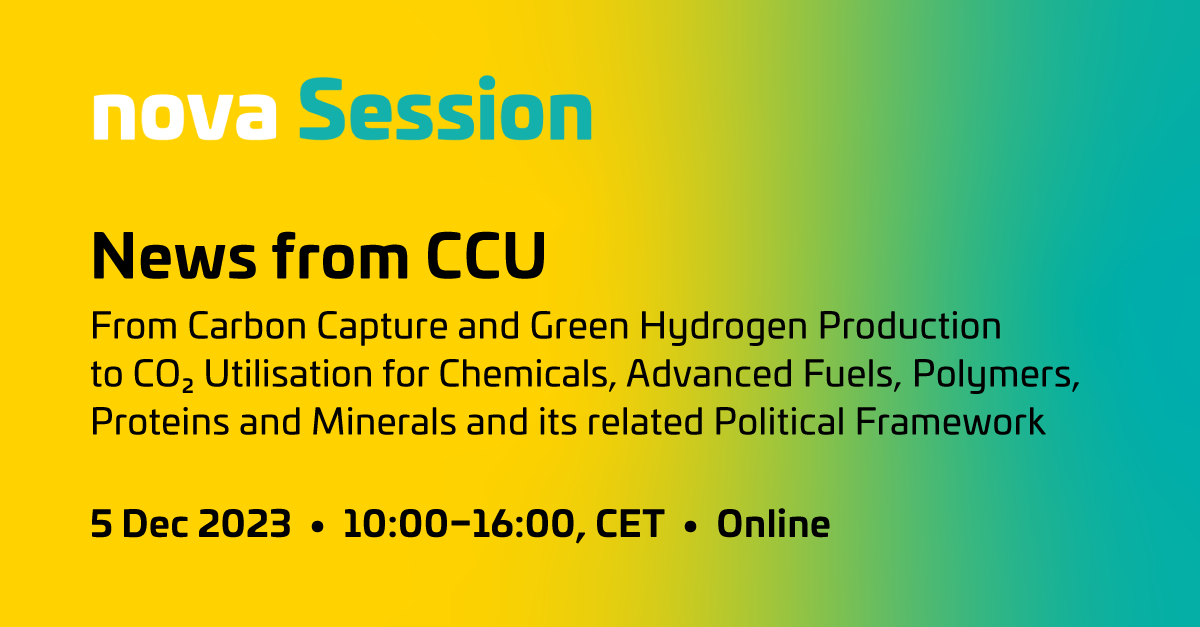
- This event has passed.
News from CCU – From Carbon Capture and Green Hydrogen production to CO2 Utilisation for Chemicals, Advanced Fuels, Polymers, Proteins and Minerals and its related Political Framework
December 5, 2023 @ 10:00 - 16:00

Hosts: Michael Carus, Achim Raschka, Pauline Ruiz, Nicolas Hark and Pia Skoczinski (nova-Institute)
Guests: Laura Martí Montaner (AIMPLAS), Célia Sapart (CO2 Value Europe), Volker Sick (Global CO2 Initiative)
Carbon Capture & Utilisation is one essential pillar for the supply of renewable carbon besides biomass and recycling and therefore one of the key technologies for the transition to sustainable chemical and fuel production and to substitute fossil feedstock sources, to fight climate change and to shift towards climate-friendly production and consumption. For providing the full benefits of CCU technologies the use of renewable energy and hydrogen is indispensable and a crucial for the production of CO2-based transportation and aviation fuels, bulk and fine chemicals.
The session will focus on developments in carbon capture, green hydrogen production, technologies and trends for CO2-based chemicals, building blocks and polymers, fuels, proteins and minerals as well as the latest policy developments for CCU.
The use of CO2 as chemical feedstock for chemicals and polymers has been intensively diversified. Several successfully implemented technologies used at commercial level are in place and many more at the laboratory and pilot phase. Besides the long-established use of CO2 for the synthesis of polycarbonates, also polyurethanes are based on it. The most notable biotechnological conversion pathway of a syngas produces ethanol at commercial scale. Additionally, high interest is also observed in CO2-based methanol and in CO2-based hydrocarbons, which can be used for fuel, chemical and polymers applications. A current total production capacity of these CO2-based products of ca. 1.3 Mt/a in 2022 is observed and a strong increase in capacity is expected by 2027.
The utilisation of CO2 as a feedstock for materials and chemicals has not gained significant traction in policy yet. However, there are some recent developments that look promising for CCU technologies, especially in energetic applications. What specific support is already there and what can be expected in future EU policy for CCU applications will be explored in this session.
Topics
- Carbon Capture – Methods and Technologies
- Green Hydrogen Production
- Technology and Trends Overview of CO2-based Chemicals and Polymers, Fuels, Proteins and Minerals
- Policy Landscape of Carbon Capture & Utilisation
Program
(all CET: Central European Time)
| 10:00 | Michael Carus (nova-Institute): Session Opening |
| Tour de Table and nova introduction | |
| 10:30 | Michael Carus (nova-Institute): Making a Case for CCU |
|
|
| Participant contributions & discussion | |
| 11:15 | Nicolas Hark (nova-Institute): Policy Landscape of Carbon Capture & Utilisation |
|
|
| Participant contributions & discussion | |
| 12:00 | Lunch break |
| 12:30 | Pia Skoczinski, Pauline Ruiz and Achim Raschka (nova-Institute): Overview on Carbon Capture & Hydrogen Production, Technology & Trends Overview of CO2-based Chemicals and Polymers, Fuels, Proteins and Minerals |
|
|
| Participant contributions & discussion | |
| 13:15 | Laura Martí Montaner (AIMPLAS): Making Value out of CO2 to Create a Circular Economy for the Plastic Sector |
| Participant contributions & discussion |
|
| 14:15 | Volker Sick (Global CO2 Initiative): Identifying Opportunities and Risks in Carbon Management |
| Participant contributions & discussion |
|
| 15:00 | Célia Sapart (CO2 Value Europe): How will CCU Contribute to Reach Climate Neutrality in the EU? |
| Participant contributions & discussion |
|
| 15:45 | Outlook & Wrap-up |
Get the newest market and policy developments for CCU. Join the nova Session and discuss with the experts.
The nova-Institute invites to the nova Session on 5 December 2023 that will take place as an online event.
21 people are attending News from CCU – From Carbon Capture and Green Hydrogen production to CO2 Utilisation for Chemicals, Advanced Fuels, Polymers, Proteins and Minerals and its related Political Framework

